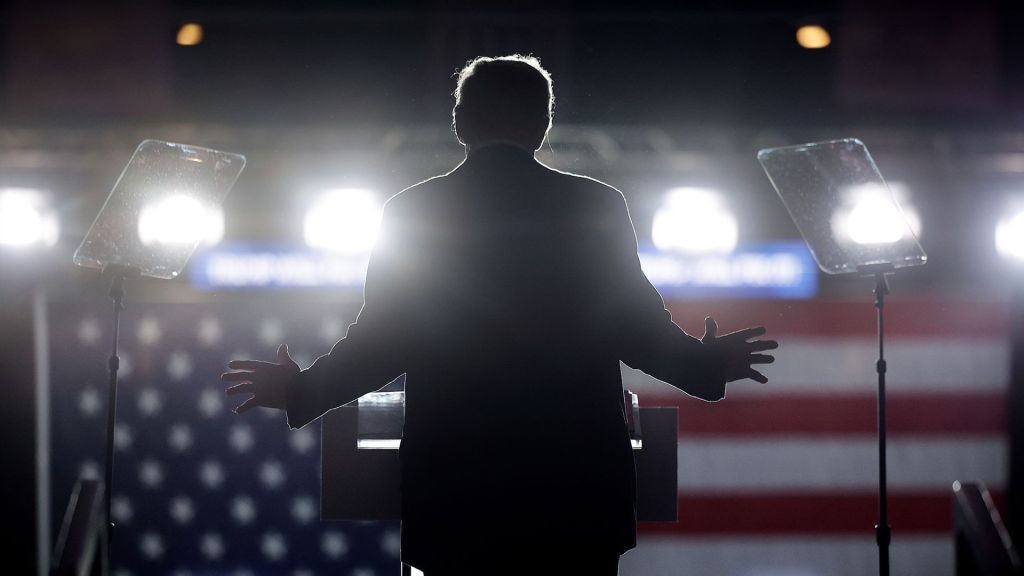As President-elect Donald Trump prepares for his next four years in the White House, he has a new potential business conflict that didn’t exist during his first term: Trump Media and Technology Group. Back in 2017, his real estate empire was the biggest focus of ethics experts. But now he’s billions of dollars richer from the publicly traded company behind Truth Social.
Trading under the ticker symbol of Trump’s initials, DJT, Trump Media has seen some wild stock swings this week. After jolting high up on Trump’s election victory, the stock fell 20% to start the trading day on Thursday, Nov. 7.
Trump is the company’s majority shareholder with an estimated 57% stake. But will he have to divest before taking over the Oval Office?
“Legally, he can keep ownership of the company, but it is problematic to have a president or other powerful politician with a controlling stake in a media company,” Richard Painter explained, a former chief White House ethics lawyer during the George W. Bush administration. “Having an independent media is very, very important. And furthermore, as president, he will have control over the Federal Communications Commission.”
“It’s a clear conflict of interest for the president of the United States to perform those executive functions while owning a substantial stake in a media company, whether it’s social media or any other,” he added.
Painter told Straight Arrow News that he is calling on Trump to divest from Trump Media and to allow the company to be owned entirely by public shareholders. He also said the name should be changed to remove affiliation with the president of the United States.
Cabinet members and other government workers are subject to financial conflict of interest rules, and many rich administration officials have been forced to divest holdings in publicly-traded companies to avoid such conflicts when holding office.
“The problem is that statute doesn’t apply to the president,” Painter said. “It should, but every other president has understood the seriousness of this issue and has avoided financial conflicts of interest, and I’m calling upon President-elect Trump to do the same.”
Trump’s former secretary of state, Rex Tillerson, divested from his Exxon Mobil shares when he took the post in 2017. Trump’s former commerce secretary, Wilbur Ross, was forced to sell stock after facing an ethics complaint. Bush’s treasury secretary, Henry Paulson, formerly CEO of Goldman Sachs, had to divest hundreds of millions worth of shares.
“I worked with [Paulson] when he came in out of Goldman Sachs. I helped arrange for $600 million worth of Goldman Sachs stock to be sold,” Painter shared. “He indeed even avoided a capital gains tax on that. There’s a certificate of divestiture that one can get from the Office of Government Ethics saying, ‘Well, the ethics lawyer told me I had to sell it,’ so you don’t have to pay the capital gains tax. You roll over the proceeds, the $600 million in this case, into other conflict free assets, such as mutual funds or Treasury securities or whatever it is, and then only pay the tax when you sell the rollover property, maybe years down the road, if ever.”
Painter explained that the criminal conflict of interest statute is written in a way that applies to every executive branch officer except the president and vice president. Similarly, members of Congress are also allowed to hold equities that may conflict with their government business dealings. Efforts to remove that immunity from Congress have so far not succeeded.
“Just as in 2017 when he took office for the first time, when many of us called for Donald Trump to divest his business holdings that could conflict with official duties, we’re asking for the same here,” Painter said. “Although his business interests are significantly expanded now, eight years later, not only with Truth Social, his social media company, but with his family investments in crypto and other ventures.”
Legally, Trump can maintain his stake in Trump Media, which is worth more than $3 billion as of Thursday afternoon.
